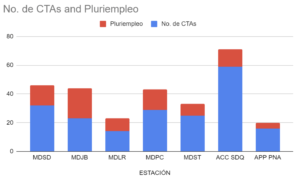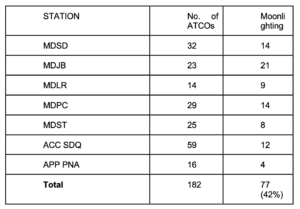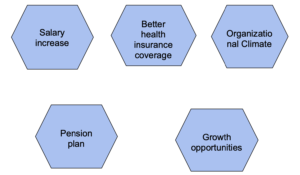62ND ANNUAL CONFERENCE, Montego Bay, Jamaica, 8-12 May 2023WP No. L166Shortage of ATC PersonnelPresented by the Dominican Republic |
Introduction
1.1. The COVID-19 pandemic has had a significant impact on the aviation industry, particularly in the reopening of air traffic services. Unfortunately, many air traffic controllers have been left behind, struggling to make ends meet due to the lack of salary adjustments in line with the increased cost of living. As a result, the desire to engage in multiple jobs has become stronger, adding to the already existing expressions of demotivation towards the job and the Dominican Institute of Civil Aviation.
1.2. It is important to acknowledge the dedication and commitment that air traffic controllers bring to their job, especially in these challenging times. However, the lack of support from the institution has led to a significant increase in demotivation and a lack of confidence in their future within the industry.
1.3. As an association, we are committed to working towards a solution that addresses these concerns and creates a better environment for our members to work in. We are actively advocating for salary adjustments that reflect the current cost of living and encouraging the institution to take concrete steps towards improving the work environment and promoting career development opportunities.
1.4. We believe that by working together, we can overcome the challenges posed by the pandemic and ensure a sustainable future for the air traffic control profession in the Dominican Republic.
Discussion
2.1. Background
2.1.1. The issue of air traffic controllers engaging in other forms of employment alongside their ATC duties is a widespread phenomenon that extends beyond the borders of the Dominican Republic. It’s a problem that plagues the global aviation industry, as it puts the safety of passengers at risk.
2.1.2. One of the major concerns arises when a significant percentage of air traffic controllers use their full-time off to engage in other activities and then return to their ATC station with their minds preoccupied with their alternative pursuits. This can compromise their ability to focus on their primary responsibilities, which requires their undivided attention and alertness.
2.1.3. While some individuals may leave the ATC profession for personal or professional reasons, the rate of attrition used to be relatively low, with only one or two people leaving every few years. However, the issue of pre-employment has led to a potential leakage of skilled labor, which could have serious implications for the aviation industry.
2.1.4. To tackle this critical issue, the Directorate of Air Navigation was alerted, and a thorough investigation into the matter of ATC personnel engaging in other employment activities was launched. It’s imperative to conduct in-depth studies to determine the magnitude of the problem and devise effective solutions to guarantee the safety of air traffic control operations. This proactive approach is vital in safeguarding the well-being of air travellers and maintaining the aviation industry’s safety standards.
2.2. Research
2.2.1. In mid-2021, a study was launched to gauge the level of job dissatisfaction among air traffic controllers (ATCs) and to determine the extent of potential personnel loss due to lack of motivation caused by various factors.
2.2.2. However, due to the sensitive nature of the topic, inviting ATC personnel to fill out a survey or questionnaire with complete honesty about whether they engage in other jobs or intend to leave their profession was challenging. The fear of being sabotaged in some way made it difficult for individuals to reveal their plans openly, which posed a significant roadblock to the study’s success.
2.2.3. Given the challenges in obtaining accurate information directly from ATC personnel, the study organizers adopted an alternative approach. They reached out to trusted individuals with a deep understanding of each ATC station and requested their assistance in providing comprehensive information.
2.2.4. These trusted individuals were chosen for their expertise and knowledge of the industry and were assured that their inputs would be kept confidential. They were asked to provide detailed insights into the work environment, job satisfaction levels, and potential reasons for personnel losses in each station.
2.2.5. By adopting this approach, the study was able to obtain valuable insights into the concerns and challenges faced by ATC personnel without compromising the privacy and confidentiality of individual employees. This method allowed for a more accurate and thorough assessment of the situation and enabled the study organizers to devise targeted solutions to improve job satisfaction and minimize personnel loss in the ATC industry.
2.2.6. The study’s scope was limited to a specific set of ATC stations in the Dominican Republic, including Punta Cana Tower, Las Americas Tower, Higüero Tower, Santiago Tower, La Romana Tower, Las Americas Control Center, and Punta Cana Approach.
2.2.7. These stations were selected based on their strategic importance and their representation of the diversity of ATC stations in the country.
2.3. Implementation and Results
2.3.1. As mentioned earlier, due to the sensitive nature of the study, data was collected verbally from trusted sources to ensure the anonymity of the respondents. The anonymity aspect was critical as it allowed the study organizers to obtain relatively accurate information without compromising the privacy and confidentiality of individual employees.
2.3.2. The data collected provided valuable insights into the factors affecting job satisfaction and potential personnel losses in the ATC industry. The data revealed that factors such as low salaries and lack of opportunities for career growth were major contributors to job dissatisfaction among ATC personnel.
2.3.3. Furthermore, the study identified pluriemployment or the practice of engaging in other forms of employment alongside ATC duties, as a significant concern. This issue has the potential to compromise the safety of air traffic control operations and requires urgent attention from industry leaders.
Below are the findings that were collected:

Whereas:

2.3.4. The data collected from the Control Center comprised information on active radar controllers and training personnel but did not include the Air Traffic Flow Management (ATFM) unit personnel. It’s important to note that active radar controllers were found to have varying schedule options to accommodate personal health situations and seniority status, which may include preferences to avoid night shifts. As a result, the study focused on approximately 30 active radar controllers.
2.3.5. It’s worth mentioning that the collected data did not discriminate against personnel who only appeared on schedules or carried out administrative functions. This ensured that all personnel, regardless of their job responsibilities, had equal representation in the study.
2.4. Operational Losses
2.4.1. Operational losses can occur when air traffic controllers have to step away from their duties for various reasons. Some examples of these reasons include suspension during an operational conflict investigation, taking medical leave due to health problems, leaving the system to pursue a scholarship, personnel who are listed on the schedule but only perform administrative functions, or resigning from their position.
2.4.2. It’s important to note that these operational losses can have a significant impact on the aviation industry’s safety and efficiency, and steps must be taken to address the root causes of these issues. By identifying and mitigating these losses, the industry can work towards ensuring the continuity of air traffic control operations and safeguarding the well-being of air travellers.
Here are some examples of the reasons for operational losses:
- Resignations: From last year to the present date, a total of seven (7) individuals have submitted their resignation from active air traffic control duty.
- Medical leave: Leave due to medical reasons, including health issues and other personal circumstances, has resulted in approximately nine (9) individuals leaving active air traffic control duty over the past year. The number of departures varies depending on each controller’s position.
- Academic leave: Some of our personnel are currently pursuing academic commitments, and there is a possibility that some of them may not return to active duty.
2.5. Advancement Opportunities and Professional Growth within the Organization
2.5.1. To address the current deficit in radar controllers and prepare for future generational turnover in the position, it’s imperative to recruit and train new personnel. The future of the air traffic control industry relies on identifying talented individuals within our current pool of personnel.
2.5.2. However, the generation currently being called upon to apply for certification in radar control lacks interest in the profession, citing various reasons such as:
- They are hesitant to neglect their existing career plans, which may not align with the demands and commitments required to become a certified radar controller.
- They do not perceive becoming a radar controller as a viable opportunity for career growth.
- They express reluctance to work closely with certain ATC supervisors, citing concerns about their competence as leaders.
- There may be other reasons contributing to their lack of interest.
2.5.3. The study surveyed a majority of air traffic controllers aged between 28 and 34 years, who possess the potential to become proficient radar controllers. However, many of these young individuals are currently focused on personal endeavors such as pursuing secondary jobs, entrepreneurship, or even the process of emigrating from the country.
2.5.4. These factors have contributed to the lack of interest in the radar control profession, as they may not align with the commitments and demands required to become certified radar controllers. Additionally, the current generation may not see becoming a radar controller as a viable opportunity for career growth, which further exacerbates the problem.
2.6. Projected Attrition
2.6.1. The current management is paying for the consequences of the organizational climate created during the previous government’s administration. This has motivated younger individuals to consider options outside of Air Traffic Control, such as seeking employment as controllers or in other fields outside of the country. Planning for migration is a process that takes months or even years, so what we are seeing today is the result of work that has been developing for some time.
2.6.2. During the past year, we verbally expressed to the management of the Air Navigation Directorate that the system was likely to lose at least ten individuals. Unfortunately, the projection was very accurate.
2.6.3. Another part of the attrition is due to age and/or health reasons. We already have several controllers out of active control. This is a race against time, and it cannot be fully planned for.
2.7. Reasons for Leaving the Organization
2.7.1. These are some of the most common reasons expressed by ATC personnel when considering either moonlighting or emigrating to other countries.

2.7.2. Regarding the reasons behind the ATC personnel leaving, the following stand out:
2.7.3. A lack of salary adjustment that keeps up with inflation is one of the primary reasons why many air traffic control (ATC) personnel are leaving their jobs. The absence of fair remuneration has had a negative impact on their quality of life, and many are hoping for better compensation to provide for themselves and their families.
2.7.4. Another critical factor affecting ATC personnel is medical insurance. Given the high- stress nature of air traffic control, it’s crucial to have comprehensive medical insurance that provides adequate coverage for health issues such as hypertension, diabetes, nervous breakdowns, sleep disorders, and other related conditions.
2.7.5. The inherited organizational climate has also contributed to fear and demotivation among ATC personnel, which has adversely affected their ability to go the extra mile and their willingness to apply for other control positions. It’s essential to address this issue and create a work environment that fosters a positive and supportive culture to motivate and retain skilled ATC personnel.
2.7.6. Professional growth and the opportunity for advancement within the organization are essential aspirations for any skilled professional, including air traffic control officers (ATCOs). However, the prevalence of a culture of favoritism and the lack of opportunities for specialization have demotivated many ATCOs.
2.7.7. In addition to the issues mentioned above, the lack of a retirement plan is also a cause for concern. Many ICAO member countries have implemented early retirement benefits, but this has not yet been established in the Dominican Republic. The absence of such benefits has generated apprehension among ATCOs, who are worried that they may not be able to retire within the established legal framework for all employees.
2.7.8. While there may be other factors contributing to the demotivation of ATC personnel, we consider these issues to be the most relevant ones. Addressing these concerns is critical to ensuring that skilled ATCOs are motivated, satisfied, and committed to providing safe and efficient air traffic control services.
Conclusions
3.1. Expected Results and Conclusion
3.1.1. As previously mentioned, the factors contributing to the widespread discontent and detachment from passion in the air traffic control profession are numerous. While salary increase is undoubtedly an essential aspect of the solution, it’s not the only answer to improving the current situation. Other job-related aspects, as well as a conducive work environment that fosters institutional commitment and loyalty, should also be considered.
3.1.2. Management should prioritize improving employee benefits, providing comprehensive health insurance coverage, implementing pension plans, promoting professional growth opportunities, among other measures. Furthermore, a true transformation of the organizational climate is required, which fosters active participation of the personnel, mutual respect, and recognition of employees’ performance.
3.1.3. In conclusion, while salary increase is a crucial component, it’s not the only one. Implementing an attractive benefits package, a suitable work environment, and an organizational culture that promotes motivation and commitment are equally critical. By doing so, it would be possible to reduce demotivation and mass exodus of staff, leading to greater stability and efficiency in the Air Traffic Control service.
3.1.4. The departure of senior ATC controllers is likely to occur sooner than anticipated due to unpredictable medical leaves caused by degenerative and terminal illnesses, as well as the collateral effects of the job.
3.1.5. In addition, many young personnel under the age of 40 are leaving the system to pursue professional jobs in other areas, leading to a gradual separation from the institution.
3.1.6. Covering personnel absences with extra shifts of young controllers can have negative effects on their health and mental well-being as it forces them to work at maximum capacity. This is not a sustainable solution and could lead to further attrition and a decrease in the quality of the Air Traffic Control service.
3.1.7. It’s crucial to address these issues and create a sustainable pipeline of skilled ATC personnel to ensure the safety and efficiency of air traffic control operations. This can be achieved by implementing measures to retain and motivate existing personnel, as well as attracting and training new talent to fill the expected vacancies. This would require a comprehensive approach that addresses salary and benefits, career growth opportunities, health and wellness programs, and a positive and supportive work environment.
3.2. Potential Practical Effects
- Motivated and engaged personnel are essential for the successful implementation of government plans to increase air traffic. However, the current situation is the opposite, with many ATC personnel feeling demotivated and disengaged. This is particularly concerning given that ATC plays a critical role in ensuring aviation safety.
- Another concern is the reduction in the number of applicants for air traffic controller positions. This can lead to a shortage of skilled personnel and affect the efficiency and safety of air traffic control operations.
- Moreover, the potential application of flow management to maintain operational safety due to insufficient personnel could result in delays. This could have a significant impact on the aviation industry, affecting airlines’ schedules, passengers’ travel plans, and the economy.
3.3. What do we Expect
3.3.1. We strongly urge the corresponding authorities to consider the current situation of the Air Traffic Control personnel and take necessary actions to improve working conditions. This includes implementing a fair salary increase and an adequate pension plan. It’s also critical to address the issues of organizational climate and foster a healthy and motivating work environment for the staff.
3.3.2. In addition, promoting institutional career paths and creating opportunities for professional growth and specialization will be instrumental in attracting and retaining young talent in Air Traffic Control. This will require enhancing personnel training and education.
3.3.3. We believe that concrete actions should be taken to prevent a crisis in the Air Traffic Control system. Failure to do so could have serious consequences for operational safety and the development of the aviation sector in the country. We urge the authorities to prioritize these issues and work towards creating a sustainable pipeline of skilled ATC personnel to ensure the safety and efficiency of air traffic control operations.
3.4. What are we doing about it?
3.4.1. As the Dominican Association of Air Traffic Controllers, we take our duty to represent and safeguard the interests of our members seriously. In light of the critical situation of staff shortages and demotivation in the workplace, we are taking measures to address this issue.
3.4.2. Firstly, we are maintaining constant communication with the management of the Air Navigation Directorate and other competent organizations to seek short, medium, and long-term solutions. We are working together to find a sustainable solution that includes not only a fair salary increase for the controllers but also improvements in working conditions and the organizational climate.
3.4.3. Moreover, we are actively promoting the air traffic control career to encourage young talents to pursue this field and aerodrome controllers to make the transition to radar control. We are also looking for alternatives to attract controllers who have left the country and may be interested in returning.
3.4.4. We strongly urge the competent authorities to value the importance of having a competent and motivated body of air traffic controllers and to take necessary measures to ensure operational safety in the country’s airports.
3.4.5. As an association, we are committed to finding solutions and improving the working conditions and operational safety for our members and the aviation industry as a whole. We will continue to work diligently towards these goals to ensure a sustainable pipeline of skilled ATC personnel and a safe and efficient air traffic control system in the country.


